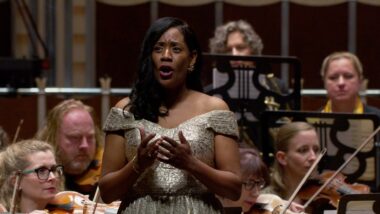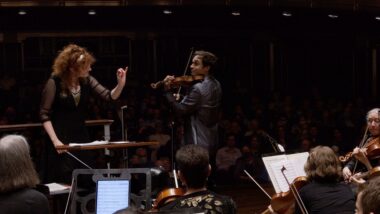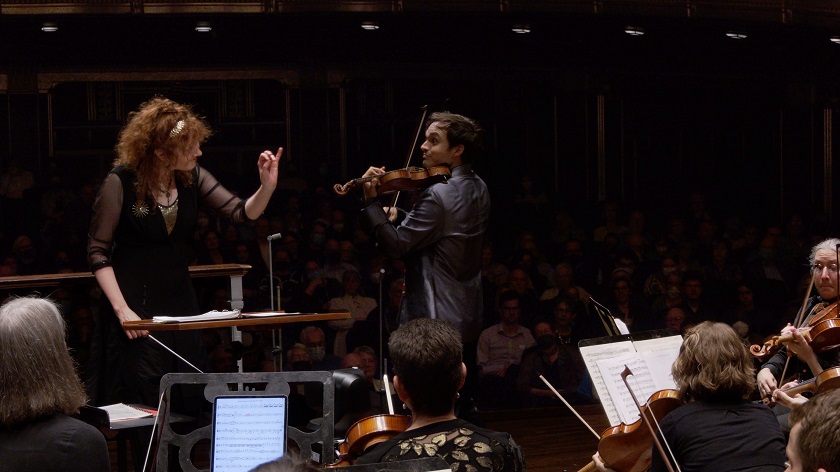 United States Mozart, Bologne: Sonya Headlam (soprano), Francisco Fullana (violin), Apollo’s Fire / Jeannette Sorrell (conductor). Mandel Concert Hall at Severance Music Center, Cleveland, 7.4.2022. (MSJ)
United States Mozart, Bologne: Sonya Headlam (soprano), Francisco Fullana (violin), Apollo’s Fire / Jeannette Sorrell (conductor). Mandel Concert Hall at Severance Music Center, Cleveland, 7.4.2022. (MSJ)

Mozart – Overture to Don Giovanni; ‘Exsultate, jubilate’ KV165; Symphony No.35 in D major KV385, ‘Haffner’
Joseph Bologne, Chevalier de Saint-Georges – Aria from L’amant anonyme; Violin Concerto in D major, Op.Post. No.2
One would have forgiven Apollo’s Fire if the ensemble had decided to rest on their laurels and trot out a concert of sure-fire greatest hits for the celebration of their thirtieth anniversary, certainly a milestone for a group which appeared out of nowhere and blazed a path to the top. In characteristic form, though, music director Jeannette Sorrell opted to match the familiar with new adventures.
The new adventures came in an exploration of music by the man once called ‘The Black Mozart’, Joseph Bologne, Chevalier de Saint-Georges (1745-1799). Bologne led a singular and unlikely life, starting in the Caribbean as the son of a French nobleman and his slave mistress. It turned out that the boy had a tremendous talent for music (among other things that included sword fighting), and he made a career for himself in France as a professional musician at a time before racism had closed the doors of society to a person of mixed-race. Bologne was a masterful violinist and wrote a wide range of pieces, including operas, concertos and symphonies. While it would do just about any other composer a disservice to be compared directly to Mozart, Bologne certainly bears the distinction of withstanding the comparison proudly. It is only the racism of later years which buried his accomplishments. Now is the time for Bologne’s resurgence, something which has been slowly building since the first sparks of modern interest emerged in the 1970s with Columbia Records’ Black Composers series.

Bologne’s Violin Concerto in D major was a new piece to me, but its arresting slow movement stands up with comparison to any of the Mozart or Haydn violin concertos of the same period. Soloist Francisco Fullana, like the orchestra itself, had more than enough personality to fill the hall, playful and daring in the outer movements (on at least one note perhaps too daring, sending the bow skittering across the string), yet dramatic and inward in the recitative-like slow movement. Sorrell and the orchestra interacted closely with Fullana, allowing an expressive flexibility that made Bologne’s music come to life in a way that made one wish to hear more.
Likewise, soprano soloist Sonya Headlam was convincing in ‘Enfin une foule…Amour, devant moi propice’, the aria from Bologne’s opera L’amant anonyme. It is a strongly-sketched song of unrequited love, which Headlam sang with poise and assurance. Her voice is not huge, but Sorrell carefully balanced the orchestra to hit expressive accents and then back off to allow Headlam’s soprano to float over the orchestra without straining. She let her voice soar more in Mozart’s gratifying ‘Exsultate, jubilate’, to the audience’s delight.
The evening opened with a somewhat uneven rendition of the overture to Mozart’s Don Giovanni. Considering that the orchestra was making an appearance in THE high temple of music in this region, perhaps there were nerves, and things started off with some entrances a bit ragged. It is also worth considering that while this concert marked the ensemble’s thirtieth anniversary, it is also a group of continually changing personnel. Familiar Apollo’s Fire members were there (and Sorrell saluted the four remaining founding members: Miho Hashizume, Julie Andrijeski, Kathie Stewart and René Schiffer), but this was a larger-than-usual assemblage, and some may not be as well integrated into the mix.
The introduction nonetheless showed the ensemble’s ability to bring life to a phrase, leaning into the anxious, rising passages. Sorrell seamlessly transitioned into a rather laid-back and genial allegro for the rest of the overture, comfortable instead of the brittle drive often heard.
By the end of the concert, everyone was firing on all cylinders in an outstanding performance of Mozart’s Haffner Symphony. Alert, lively and lithe, the first movement was joyous instead of mistakenly monumental. The slow movement was particularly effective thanks to the oboes and bassoons being on an elevated platform at the rear of the orchestra. The hall’s intimate acoustics, the players’ skills and Sorrell’s skillful balancing allowed the expressive woodwinds to float their pastel, reedy tones out over the bed of string instruments. As wonderful as modern winds are, they can’t float their tones like that.
After an unhurried minuet, the finale skittered along at witty top speed. The performance sprinted to its end, bringing the audience to their feet. An encore followed, led by ensemble member Emi Tanabe and including a surprise return by Fullana, that weaved in quotes from the evening’s works with Mozart’s ‘Rondo alla Turca’, a moment of sheer delight capturing the special alchemy that launched Apollo’s Fire onto the world stage. One can only hope the ensemble’s next thirty years will prove just as enlightening.
Mark Sebastian Jordan
